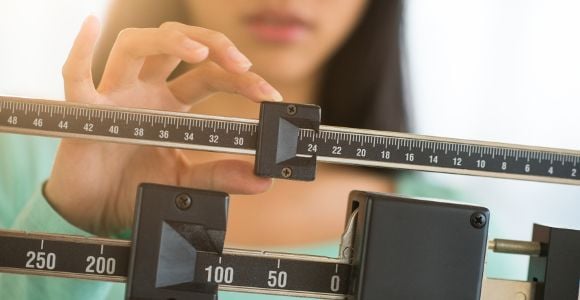The HCG diet seems to be the latest buzz weight loss word lately even though this diet has been around since the 1950's. HCG is short for human chorionic gonadotropin, a hormone released during pregnancy. Pregnant women release this hormone early in their pregnancy, and one of its main jobs is to mobilize the woman's fat stores to go to the developing fetus. This ensures the fetus will be able to grow even if the woman's food intake is inadequate to for the fetus during the early stages of pregnancy.
So how did this pregnant-released hormone get to be a weight loss supplement? Dr. A.T.W. Simeons noticed that HCG could have the potential as a weight loss supplement in the 1950's, and he conducted a study showing a very lox calorie diet with HCG injections led to weight loss. However, since then, peer reviewed research has shown no significant difference between a very low calorie diet and a very low calorie diet with HCG injections. In fact, fast forward to 1975, and the Food and Drug Administration (FDA) requires any supplement with HCG to say, "HCG has not been demonstrated to be effective adjunctive therapy in the treatment of obesity. There is no substantial evidence that it increases weight loss beyond that resulting from caloric restriction, that it causes a more attractive or 'normal' distribution of fat, or that it decreases the hunger and discomfort associated with calorie-restricted diets." Interestingly, the FDA does recognize HCG as a fertility treatment drug.
The HCG diet consists of at least 26 days and up to 40 days with a daily injection of HCG. After the third daily injection, only 500 calories per day is allowed. High protein and low starch foods are recommended. After three weeks on this protocol, starches may be added slowly back in. Some side effects with HCG injections include: increased risk of clot development, headaches, restlessness, and depression. Also, after 40 days of treatment, the body develops antibodies to HCG. Anyone brave (or crazy) enough to try this diet more than once needs to wait at least six weeks before another try.
The question is not if you will lose weight on this diet. It is pretty safe to say anyone eating 500 calories per day will lose weight. The question is will the weight loss last, and what happens when food intake comes up again? As with most quick, fad diets, weight gain may be inevitable afterwards. Getting the weight off after this diet will probably be harder than before because your metabolism is slowed due to the drastic decrease in food intake. Also, there is no exercise with this diet protocol, probably because it is not feasible on 500 calories per day. Because of this, lean muscle loss will occur with fat loss. Maintained weight loss still is the equation of having fewer calories in than expended, and keep moving and making healthy food choices. This will also prevent the yo-yo cycle of fad dieting that results in weight loss, then weight regain repeated.
Holly Klamer is a Registered Dietitian and personal trainer in Colorado. She received her undergraduate degree with a double major in Dietetics and Health Fitness from Central Michigan University. She then went to Colorado State University for her Master's degree in Human Nutrition emphasizing in Exercise Science. There she completed her dietetic internship to be a Registered Dietitian and was a teaching assistant in the nutrition department. Holly loves to travel, be outside, run, road bike and hike. She ran cross country and track in college and still enjoys competing in long distance running. Her passions are in sports nutrition, disordered eating, teaching others how to eat healthy on a limited budget, worksite wellness, weight loss and food allergies. She enjoys public speaking for various nutrition topics especially to young athletes, writing nutrition education material, and individual counseling. Holly has a passion to help people reach their goals of health and improve athletic performance. She currently works as a personal trainer, sports dietitian and free lance writer for various health websites. To contact Holly, email her at [email protected].



